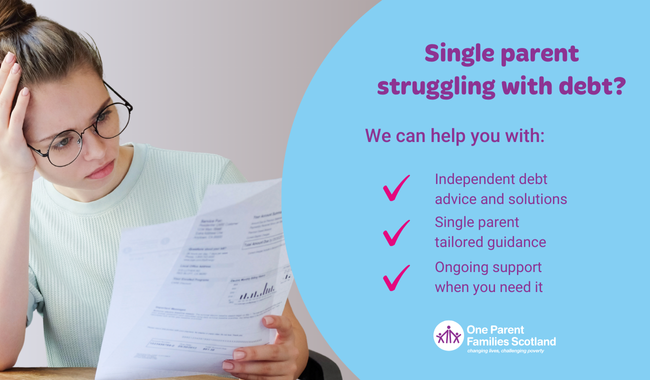Money and debt advice service
Last updated: 20/01/2026
Our national money and debt advice service supports single parents across Scotland.
We also offer a financial inclusion service for Glasgow only, click the link below.
Financial inclusion support in Glasgow

- Single parent, Glasgow
How to get in touch with the service
You don't have to face money worries alone.
Click the button to get in touch with our money and debt advice service. If you would like to make your referral over the phone, contact our Helpline by calling 0808 801 0323.
We give advice on all statutory debt solutions in Scotland.
Fill out our referral formBudgeting and money resources
Try our free budgeting and debt tool.
Try our free benefits calculator.
Our My Life and Me wellbeing website has info around steps you can take to feel more in control of your finances and to manage your money worries.
About the service
OPFS’s debt service provides free, confidential advice for single parents anywhere in Scotland. Our expert advisers will work with you every step of the way to:
- Understand your financial situation
- Explore all the available options for managing your debt
- Provide support with putting solutions into action
We are authorised and regulated by the Financial Conduct Authority, so you can trust that you are in safe hands.
About debt solutions
There are a range of debt solutions available in Scotland which we can guide you through, including:
Debt Arrangement Scheme (DAS)
A DAS is a formal repayment plan which is only available in Scotland. With a DAS, both interest and charges are frozen. In addition, creditors cannot take legal action to recover your debts.
This scheme allows you to make one, affordable payment which is shared between your creditors until all of the debt is repaid.
Minimal Asset Process (MAP)
A MAP is a route into bankruptcy, which is known as sequestration in Scotland. A MAP can be used by people with low income or no assets. You do not make a payment through the MAP route and are typically discharged from your debts after 6 months.
Trust Deed
A Trust Deed is a voluntary agreement between you and your creditors which is managed by a Trustee. If it is accepted by your creditors, the Trust Deed becomes “protected” and typically lasts for 4 years. Once completed, your unsecured debts are written off.
A Trust Deed may not be suitable in all cases, for example if there are any assets or lump sums that need to be protected.
Sequestration
Sequestration is the name for bankruptcy in Scotland. Like a Trust Deed, bankruptcy is managed by a trustee. Creditors don’t get to object to sequestration, meaning it can be a useful route to clearing unaffordable debt.
Informal Arrangement
Depending on your circumstances, you might be able to negotiate repayments with your creditors outside of a statutory solution. We can give you advice on all of your options, including on debt consolidation, settlement offers or temporary token repayments until your circumstances improve.
You do not need to be on benefits to access our support. Whether you are behind on payments or just worried about money, talk to us.
How we can help
You will get clear explanations of what each option means for you and your family, so you can make the right choice for managing your finances. The OPFS debt service can help you:
- Understand your debt and how it impacts you
- Look at the options available for managing your debt
- Provide support to put your chosen solutions into action
- Help with budgeting and day-to-day money management
- Explain how changes such as returning to work or starting training can impact your finances